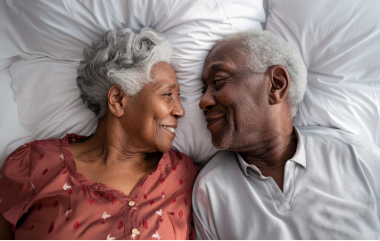Gratitude is more than just a warm feeling; it may hold the secret to a longer life, especially for older adults.
A study published in JAMA Psychiatry by Harvard T.H. Chan School of Public Health found that experiencing gratitude may help older adults live longer. Researchers assessed gratitude and mortality among nearly 50,000 women, finding that those who scored highest on a gratitude questionnaire had a lower risk of death over four years compared to those with the lowest gratitude scores.
How can you intentionally cultivate gratitude? New research suggests that sleep might be the key to boosting those grateful feelings.
How sleep affects gratitude
A 2024 study in the journal SLEEP suggests that healthy sleep positively impacts feelings of gratitude, resilience and flourishing.
Researchers assigned 90 participants to different sleep schedules for a week. Some had to stay up late, others went to bed early and a third group kept their normal routine. Sleep patterns were monitored closely using actigraphy (a method that tracks movement during sleep).
Those who went to bed earlier and extended their sleep by about 46 minutes per night showed noticeable improvements in sleepiness, mood and gratitude. In fact, they wrote twice as much on their gratitude lists compared to the other groups. On the flip side, participants who had restricted sleep — going to bed later and getting about 37 minutes less sleep each night — reported lower gratitude and more mood disruptions.
What does this mean? Even small shifts in sleep habits can influence gratitude, resilience and feelings of flourishing.
Better thoughts, better sleep
The link between gratitude and sleep goes beyond just getting more hours. A 2009 study in the Journal of Psychosomatic Research found that gratitude influences sleep through our thoughts before bed. According to the study, grateful people tend to have more positive thoughts and fewer negative or worrying thoughts when falling asleep, leading to better sleep quality and duration. They also function better throughout the day.
Pre-sleep thoughts matter more than you might think. Research shows that optimistic thoughts lead to self-reported better sleep. In contrast, worries and negative thoughts can keep you awake. Focusing on gratitude before bed may help improve your sleep.
Why it all matters
When people get better sleep, they feel more positive, and those feelings encourage prosocial behaviors like kindness and generosity. The SLEEP study suggests that sleep might be the foundation for these emotions.
So, what’s the takeaway? Adopting healthy sleep habits — like keeping a consistent sleep schedule — could improve your well-being and increase feelings of gratefulness. This, in turn, may lead to further improvements in your sleep. Better sleep and more gratitude may not just benefit you but also strengthen your relationships and interactions with others.
Tonight, consider this: What’s one thing you feel grateful for? Maybe a little extra sleep will help you find even more reasons to be thankful tomorrow.
Medical review by Margaret Hovda, MD
Related:
- Sleep loss affects generosity, desire to help others
- Improve your sleep in five simple steps
- The ‘Mind after Midnight’: People more likely to make bad decisions late at night




